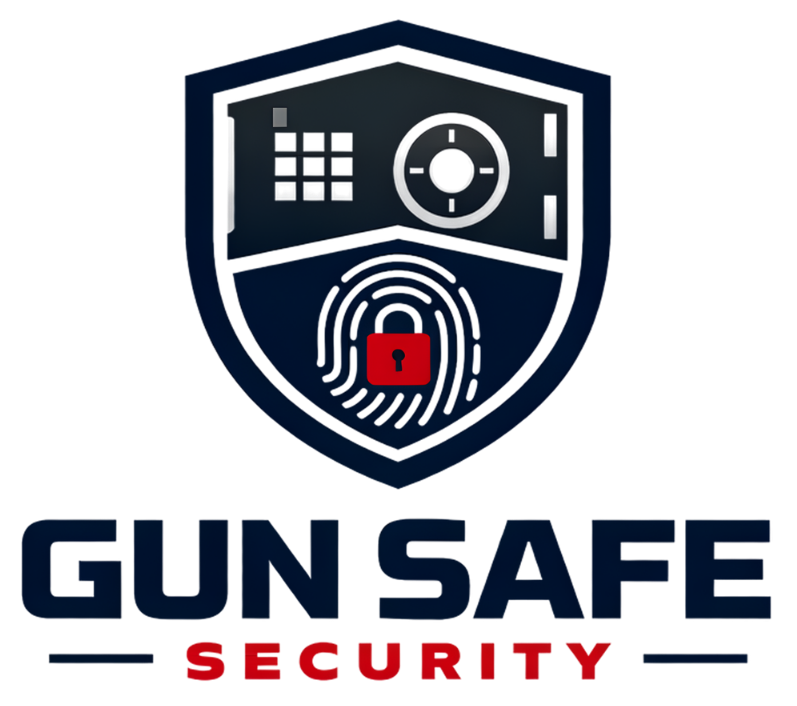Have you ever wondered just how accurate revolvers really are? If you’re curious about their precision and whether they can hit the mark when it counts, you’re in the right place.
Accuracy can make all the difference, whether you’re at the range, out hunting, or considering self-defense options. This article will break down the facts in simple terms, helping you understand what affects a revolver’s accuracy and what you can expect when you pull the trigger.
Keep reading to discover the truth behind these classic firearms and how they perform when it matters most.
Factors Affecting Revolver Accuracy
Revolver accuracy depends on many small details. These details work together to affect how well a revolver shoots. Understanding these factors helps you know what to expect from your firearm. It also guides you in choosing or maintaining your revolver for better accuracy.
Each part of a revolver plays a role in accuracy. The barrel, cylinder, trigger, and even the bullets all matter. Knowing how these parts influence your shot can improve your shooting experience.
Barrel Length And Its Impact
The barrel length changes how the bullet travels. A longer barrel gives the bullet more time to gain speed. This often leads to better accuracy and more power. Short barrels are easier to carry but may reduce accuracy. The right barrel length depends on your shooting needs and comfort.
Cylinder Alignment Issues
The cylinder must line up perfectly with the barrel. Misalignment causes bullets to hit off target. Even a small gap can reduce accuracy. Regular checks and maintenance keep the cylinder in place. Proper alignment ensures each shot hits where you aim.
Trigger Mechanism Influence
A smooth trigger pull helps keep the gun steady. A heavy or rough trigger can make you jerk the gun. This movement lowers accuracy. Some triggers have adjustable tension to fit your style. Practicing with your revolver improves trigger control and shooting precision.
Ammunition Quality And Consistency
Good ammunition shoots straighter and more reliably. Cheap or old bullets may cause jams or poor grouping. Consistent bullet size and powder amount matter for accuracy. Using quality ammo that fits your revolver helps maintain tight shot groups. Try different brands to find what works best.

Comparing Revolvers To Other Firearms
Comparing revolvers to other firearms helps understand their accuracy in different situations. Each type of gun works in its own way. This affects how well it shoots and how easy it is to use. Knowing these differences can guide you to the right choice for your needs.
Revolvers Vs. Semi-automatic Pistols
Revolvers have fewer moving parts than semi-automatic pistols. This makes revolvers simple and reliable. Semi-automatics can shoot faster and hold more bullets. But they need more care and cleaning. Revolvers often have a heavier trigger pull, which can affect accuracy. Semi-automatics usually have lighter triggers, helping with faster, more precise shots.
Revolvers Vs. Rifles
Rifles are built for long-range shooting. They have longer barrels and better sights than revolvers. Revolvers work best at close to medium ranges. Rifles offer more power and higher accuracy over distances. They are usually heavier and less easy to carry than revolvers. Revolvers are easier to handle in tight spaces or quick-draw situations.
Situational Accuracy Differences
Revolvers shine in simple, quick shooting scenarios. They are less likely to jam and easy to reload in emergencies. Semi-automatics score higher in fast follow-up shots and larger magazines. Rifles dominate in precision and distance shooting. Choosing the right firearm depends on where and how you plan to shoot. Each gun type fits different accuracy needs.
Common Misconceptions About Revolver Precision
Many people believe revolvers are not precise. These ideas come from old stories and misunderstandings. It is important to clear up these myths. Revolvers can be very accurate with the right use. Let’s explore some common misconceptions about revolver precision.
Myth Of Inherent Inaccuracy
Some think revolvers are less accurate than other guns. This is not true. Revolvers have fewer moving parts in the firing system. This can mean less chance of error. The cylinder gap can cause slight loss of gas, but it does not ruin accuracy. Many revolvers shoot tight groups at the range. The design itself does not limit precision.
Effect Of Shooter Skill
Shooter skill plays a big role in accuracy. Even the best gun cannot fix poor aim. Proper grip, stance, and trigger control matter a lot. Revolvers often require a smooth trigger pull. Beginners may find this tricky at first. With practice, accuracy improves significantly. The shooter’s experience often affects results more than the gun.
Maintenance And Its Role
Clean and well-maintained revolvers perform better. Dirt and rust can cause parts to stick or misfire. Regular cleaning helps keep the barrel and cylinder smooth. Lubrication ensures parts move freely. A neglected revolver may lose accuracy over time. Proper care supports consistent and reliable shots.
Testing Revolver Accuracy
Testing revolver accuracy helps understand how well these guns perform. It shows their true precision under different conditions. Various tests reveal the strengths and weaknesses of revolvers. These tests range from controlled settings to real-life use. Each test gives useful data about the revolver’s aim and consistency.
Accuracy can change with distance, shooter skill, and environment. Testing covers these factors to give a clear picture. Knowing this helps users choose the right revolver for their needs.
Standardized Accuracy Tests
Standardized tests use fixed targets at set distances. Shooters fire a series of shots under the same rules. This method measures group size and shot placement. It removes variables like wind or movement. Results show the revolver’s mechanical precision. These tests are common in labs and competitions. They give a baseline for comparing different models.
Real-world Shooting Scenarios
Real-world tests involve practical situations like hunting or self-defense. Shooters deal with stress, movement, and changing light. These factors affect accuracy beyond pure mechanics. This testing shows how a revolver performs in daily use. It reveals handling, recoil control, and quick aiming skills. These tests help buyers see true performance outside the range.
Impact Of Shooting Distance
Distance plays a key role in revolver accuracy. Close shots are easier and more precise. As distance grows, bullet spread increases. Shooters must adjust aim and technique. Most revolvers stay accurate within 25 yards. Beyond that, accuracy depends on barrel length and ammo quality. Testing at various distances shows the revolver’s effective range. This helps users understand limits and capabilities.
Enhancing Revolver Accuracy
Enhancing the accuracy of a revolver improves shooting confidence and results. Small adjustments and care make a big difference in hitting the target. Focusing on key areas helps shooters perform better with their revolvers.
Upgrading Sights
Better sights help aim more precisely. Many revolvers come with basic sights. Replacing them with fiber optic or adjustable sights improves visibility. Clearer sight pictures lead to better shot placement. Upgraded sights also help in low light conditions.
Customizing Trigger Pull
A smooth trigger pull reduces movement during shooting. Heavy or rough triggers cause the gun to shift. Gunsmiths can lighten and smooth the trigger action. This change allows for a cleaner, more controlled shot. Consistent trigger pull leads to better accuracy.
Using Quality Ammunition
Good ammunition ensures stable and consistent performance. Cheap ammo may cause irregular shots or jams. High-quality rounds have uniform powder and bullet weight. This consistency helps maintain accuracy shot after shot. Testing different brands finds the best match for your revolver.
Regular Cleaning And Maintenance
Clean revolvers shoot more reliably and accurately. Dirt and residue build-up affects barrel and cylinder alignment. Regular cleaning removes fouling and prevents rust. Lubricating moving parts keeps the action smooth. Well-maintained revolvers perform better on every shot.


Frequently Asked Questions
How Accurate Are Revolvers Compared To Semi-automatic Pistols?
Revolvers generally offer good accuracy at short to medium ranges. Their simpler mechanics reduce misfires. However, semi-automatic pistols often provide better accuracy with faster follow-up shots and higher capacity.
What Factors Affect Revolver Accuracy?
Barrel length, ammunition quality, and shooter skill greatly influence revolver accuracy. A longer barrel improves sight radius and velocity. Proper grip and trigger control also play key roles.
Are All Revolvers Equally Accurate?
No, accuracy varies by model, barrel length, and build quality. High-end revolvers often have tighter tolerances and better sights, enhancing precision. Cheaper models may sacrifice accuracy for affordability.
Does Barrel Length Improve Revolver Accuracy?
Yes, longer barrels increase sight radius and bullet velocity, boosting accuracy. They help stabilize the bullet’s trajectory. However, longer barrels can reduce maneuverability.
Conclusion
Revolvers can be quite accurate for short to medium distances. The shooter’s skill and practice play a big role in hitting targets. Quality of the revolver and ammunition also matter. Keep the gun clean and well-maintained for best results. Remember, no gun is perfect, but revolvers offer reliable accuracy.
They work well for self-defense and target shooting alike. Understanding their strengths helps you use them better. Accuracy depends on many factors, not just the gun itself. Simple care and good technique go a long way.

